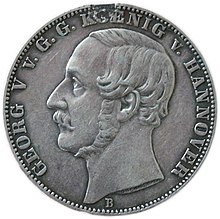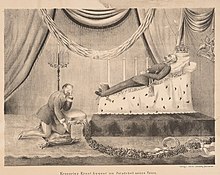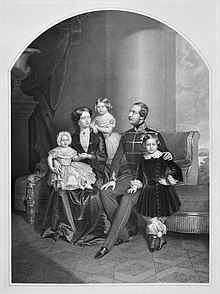Georg V (Hanover)
George V , King of Hanover and 2nd Duke of Cumberland and Teviotdale (born May 27, 1819 in Berlin , † June 12, 1878 in Paris ) was the last King of Hanover .
Life
Origin and time as Crown Prince (1819–1851)
Prince Georg Friedrich Alexander Karl Ernst August , KG , was the son of King Ernst August of Hanover from the German-British dynasty of the House of Hanover and his wife Friederike . He was a first cousin of Queen Victoria and grew up in Berlin and Great Britain. After the end of the personal union between Great Britain and Hanover and his father's accession to the throne in Hanover, he became crown prince, but remained as the legitimate male descendant of King George III. Member of the British royal family and second in line to the British throne - until the birth of Queen Victoria's first child, Princess Victoria in 1840.
On July 14, 1839, Georg V met the 21-year-old Marie von Sachsen-Altenburg in his summer residence at Schloss Monbrillant . They married on February 18, 1843 in the castle church of Hanover .
The couple first moved into the Fürstenhof in Calenberger Neustadt , then the Ernst-August-Palais in Adolfstraße . Her son and two daughters were born around this time.
Georg was blind at a young age . He lost his eyesight on the left in 1829 due to an illness, on the right in 1833 due to an accident that resulted in a strong capsule. Although this gave rise to doubts about his suitability, his father advocated that he should become king by ordering in 1842 that the heir to the throne should sign government documents in the presence of sworn witnesses. However, throughout his life he tried to hide his blindness in public. Georg, who had already represented his father during a long absence in Great Britain in 1843, followed him after his death on November 18, 1851 as King of Hanover, 2nd Duke of Cumberland and Teviotdale and Earl of Armagh .
Domestic politics


From his father and his maternal uncle, Karl Friedrich zu Mecklenburg (1785–1837), one of the most influential men at the Prussian court, he had adopted a feudal and autocratic conception of the state. The conception of his kingship became particularly clear through the emphasis on divine right , which stood in stark contrast to the constitutional monarchy that was predominant at the time . Hanover was one of the most backward state structures in the German Confederation .
George V combined his politics with the monarchical principle in order to strengthen the royal sovereignty over the state parliament again. His father Ernst August I had to have a constitution drawn up in the wake of the unrest in the revolutionary year of 1848 . The new King of Hanover wanted to restrict these liberal tendencies again. The instrument for this was the Hanoverian Bundestag envoy Eduard von Schele zu Schelenburg . As Prime Minister Schelenburg should form a new cabinet. It was the first of six cabinets that Georg appointed during his 15-year reign.
On August 1, 1855, George V repealed the liberal constitution of 1848 and largely restored the constitution of 1840. In the cabinet established in the same year, for the first time exclusively aristocrats were represented. His favorite and minister, Count Borries , even went so far as to plan to transform the Kingdom of Hanover into an absolutist monarchy . George V felt himself confirmed in his role by such thoughts. He believed he was infallible because of his institution by God. This view had fatal effects on his foreign policy.
In addition to the liberal-national tensions of the reaction era (1848–1858), there was a further domestic political challenge in the aftermath of the industrial revolution . This led to the emergence of a broad class of workers in many member states of the German Confederation . In connection with the unsolved social grievances (see social question ) there was a potential danger for the traditional social order from the point of view of George V. A central goal of his policy was therefore to curb the developments of technical progress in the Kingdom of Hanover and thus at least to slow down the formation of a workforce. Factories were not allowed to settle in the royal seat of Hanover until the fall of the kingdom. The king's promotion of guilds and guilds hindered the free development of the economy. Only at the end of his reign did the king encourage the construction of the railway and establish the Georgs-Marien-Hütte near Osnabrück , which he financed from his own crown treasury.
George V was a religious man and took his summers episcopate about the Lutheran regional church very seriously. The neo-Lutheran catechism , which he introduced by ordinance on April 14, 1862 , met with fierce opposition ( catechism dispute ), so that he had to revoke the obligation in August of the same year. The subsequent dismissals and the creation of a parliamentary regional synod in 1863 led, against Georg's intention, to strengthening the liberal currents in church and state.
Foreign policy
The foreign policy situation of George V was shaped by the German dualism or the striving for supremacy of the great powers Prussia and Austria within the German Confederation . As the king of a medium-sized state , Georg was unable to pursue an independent policy, but had to move closer to either Prussia or Austria. Georg perceived this as a sensitive interference with his sovereignty as king, legitimized by God. In contrast to his father, the king harbored a deep dislike for Prussia, which bordered the Kingdom of Hanover in the west and east, when it came to the question of federal reform, the matter of coastal protection, the customs union crisis and other occasions Days occurred. Georg V. Prussia refused permission to build the railway line from Minden to the Prussian war port in Wilhelmshaven .
Against the resolution of his state parliament, he refused to agree to the Prussian demand for neutrality and thus to break with the German Confederation in the impending German war , but joined the other loyal medium-sized states. On June 15, 1866, the Prussian envoy demanded the conclusion of an alliance within 24 hours. George V was also supposed to submit his army to the supreme command of the Prussian troops and to approve the convocation of a German parliament. On the evening of June 15, 1866, the magistrate and mayor of Hanover tried to convince the king of an alliance with Prussia. Unimpressed by this, Georg concluded his speech with the words: "As a Christian, a monarch and a Welf, I cannot act otherwise."
On June 16, 1866 at 3 o'clock in the morning, Georg V went to Göttingen in his saloon car to join his 20,600-strong army . After the inevitable surrender despite the tactically successful battle of Langensalza , the Kingdom of Hanover was occupied by Prussian troops and annexed on September 20, 1866.
Exile (1866–1878)
The king fled to Vienna (where he moved into the Villa Hügel in Hietzing ), and his family followed him into exile in Austria a year later after a temporary stay in Marienburg Castle .
The exiled George V refused to the end to give up his claims to the Kingdom of Hanover and to recognize the annexation . He appealed in vain to the major European powers and in his exile in Paris published the magazine “Situation”, which attacked the new order of things in Germany every day in the most violent terms and stirred up France's hatred of a Germany becoming more Prussian. In 1867, with the help of the writer Oskar Meding (later as the novelist Gregor Samarow), he had a private army of Hanoverian refugees set up in France in order to recapture his empire in the event of a Franco-German war on the French side ( Welfenlegion ), which ultimately led to that Prussia suspended financial compensation that had already been promised and confiscated its private assets ( Welfenfonds ). Unreconciled and seriously ill until the end, the blind king died on June 12, 1878 in Paris . His body was transferred to England and buried in the tomb of St George's Chapel in Windsor Castle .
Promoter of culture and economy
The king and his wife Marie gave their name to the Georgs-Marien-Bergwerks- und Hüttenverein in Georgsmarienhütte , which was founded in 1856 and operated a steelworks there. Both supported the founding ideally and financially.
In 1869 both had the church of St. Georg-Marien, named after them, built in Ilfeld .
King Georg was a Freemason and from 1857 Grand Master of the Grand Lodge of Hanover until it was dissolved in 1866.
Under the reign of George V, the courtly and civil musical life in Hanover experienced a great boom. As a pianist and composer he himself gave decisive suggestions. Of his around 200 works, art songs and songs for Hanover male choirs as well as pieces of music for music corps are to be mentioned. Although he gave preference to easily comprehensible melodies in the style of Italian bel canto and theoretically represented this in popular aesthetic writings, he also promoted the work of his contemporaries Hector Berlioz , Robert Schumann , Richard Wagner and Johannes Brahms .
Others
King Georg V of Hanover was the first shooting king in the Tostedter shooting club from 1854 e. V. Heinrich Narten fired the king's shot for the blind king. The Tostedter riflemen have close ties to the Kingdom of Hanover and still wear the uniform of the Hanoverian hunters , after which the bulletin of the rifle club was named.
The Georgianum grammar school in Lingen is named after him.
progeny

1878 in Windsor , lithograph published by Bernhard Lenzesky, Hanover

The marriage with Queen Marie had three children:
- Ernst August (1845–1923), Crown Prince of Hanover and 3rd Duke of Cumberland and Teviotdale ⚭ Princess Thyra of Denmark (1853–1933)
- Friederike (1848–1926) ⚭ Alfons von Pawel-Rammingen
- Marie (1849–1904), unmarried
Queen Marie , Crown Prince Ernst August and Princess Marie are buried in the mausoleum of Cumberland Castle in Gmunden , Princess Friederike rests like her father in the crypt of St George's Chapel at Windsor Castle .
Fonts
- Geoffrey Malden Willis (ed.): Hanover's fateful year 1866 in King George V's correspondence with Queen Marie. Hildesheim 1966.
- Ideas and reflections on the properties of music. Helwing, Hannover 1839 ( digitized version )
- About music and singing. Holzhausen, Vienna 1879 ( digitized version )
See also
literature
- Alexander Dylong: Hanover's last ruler. King George V between Guelph tradition and political reality. MatrixMedia, Göttingen 2012, ISBN 978-3-932313-49-3 . According to Thomas Vogtherr, the book is shaped by a welf-friendly perspective.
- Gudrun Keindorf, Thomas Moritz (eds.): "Bigger even than Heinrich the Lion." King George V of Hanover as the builder and identity giver. Volume accompanying the exhibition, Göttingen State and University Library, Paulinerkirche. Mecke Verlag, Duderstadt 2003, ISBN 3-936617-16-3 .
- Wilhelm Rothert : General Hanoverian biography. Volume 2: In the Old Kingdom of Hanover 1814–1866. Sponholtz, Hannover 1914, pp. 147-174.
- Georg Schnath: Georg V .. In: New German Biography (NDB). Volume 6, Duncker & Humblot, Berlin 1964, ISBN 3-428-00187-7 , p. 214 f. ( Digitized version ).
- Karl Wippermann : Georg V., Friedrich Alexander Karl Ernst August . In: Allgemeine Deutsche Biographie (ADB). Volume 8, Duncker & Humblot, Leipzig 1878, pp. 657-670. (with correction)
- The royal exile in Hietzing . In: The Gazebo . Issue 28, 1867, pp. 437-438 ( full text [ Wikisource ]).
Web links
- Literature by and about George V in the catalog of the German National Library
- Works by and about Georg V in the German Digital Library
- further information on Georg V. welfen.de
- Edda Dammmüller: May 27, 1819 - birthday of Georg V. WDR ZeitZeichen (podcast).
Remarks
- ↑ A lithograph with the portrait of the king with Freemason signets , made by Julius Giere after Carl Oesterley senior , was used as the frontispiece for the text Freemasonry in the Oriente from Hanover. Reminder sheets for the festivities of January 14th and 15th, 1857 from 1859 can be found in the Gottfried Wilhelm Leibniz Library - Lower Saxony State Library . Illustration in Siegfried Schildmacher (Ed.), Wolfgang Dittrich (Red.): Freemasons - Secret Society or Ethics School? History and work of the Freemasons in Hanover , accompanying volume to an exhibition in the Historical Museum Hanover from September 5, 2012 to January 6, 2013, Hanover: Verlag der Gottfried Wilhelm Leibniz Library, 2012, ISBN 978-3-943922-01-1 , p 93
Individual evidence
- ↑ Alheidis von Rohr : The way to the crown. Symbols of power and rule of the Guelphs. MatrixMedia, Göttingen May 2014, pp. 126–127.
- ↑ Main State Archives Hanover : Dep. IX G 2 Box 945 (construction of a railway carriage for the Hanoverian king); Alheidis von Rohr : State and city car from the Hanoverian stables. Historical Museum am Hohen Ufer, Hanover 1980, p. 15.
- ^ Dieter Brosius : Hanover as a royal residence . In: History of the City of Hanover . Volume 2: Klaus Mlynek , Waldemar R. Röhrbein (ed.): From the beginning of the 19th century to the present . Schlütersche, Hannover 1994, ISBN 3-87706-364-0 , pp. 305-308; online through google books
- ↑ a b Thomas Vogtherr: The Welfs: From the Middle Ages to the Present . S. 85 ( limited preview in Google Book search).
- ^ Klaus Mlynek, Waldemar R. Röhrbein: Hanover Chronicle: from the beginnings to the present . Schlütersche Verlagsanstalt, 1991, p. 122 ( limited preview in Google Book search).
- ^ Michael Wrage: The State Council in the Kingdom of Hanover . S. 69 ( limited preview in Google Book search).
- ↑ a b c d Waldemar R. Röhrbein: Stadtlexikon Hannover: From the beginnings to the present . S. 210 ( limited preview in Google Book search).
- ↑ a b Winfried Sühlo: George Herbert Graf zu Münster . S. 52 .
- ↑ a b Axel Schildt, Dietmar Schiersner, Frank Engehausen, Gabriele Metzler, Hans-Ulrich Thamer, Jörn Leonhard, Kay Peter Jankrift, Michael Erbe, Walter Mühlhausen: Milestones in German history: From antiquity to today: Revolution from above: reaction era . S. 467 ( limited preview in Google Book search).
- ^ Reimer Egge: The long farewell: The end of the Kingdom of Hanover in 1866 and the consequences . Ed .: Museum Schloss Holdenstedt. S. 77 .
- ↑ When the king gambled away (Regional Church of Hanover)
- ↑ Michael Wrage: The Council of State in the Kingdom of Hanover 1839-1866 p. 85 . S. 85 ( limited preview in Google Book search).
- ^ Eugen Lennhoff, Oskar Posner: International Freemasons Lexicon . Reprint from 1932. Almathea-Verlag Munich 1980, ISBN 3-85002-038-X
- ^ Günter Katzenberger: Hanover, IV. 1814 to 1866. In The Music in Past and Present. Second, revised edition, part 4, Kassel et altera 1996, column 33.
- ↑ Thomas Vogtherr: The Welfs: From the Middle Ages to the Present . S. 107 ( limited preview in Google Book search).
| predecessor | Office | successor |
|---|---|---|
| Ernst August I. |
King of Hanover 1851–1866 |
--- |
| Ernst August I. |
Head of the House of Hanover Duke of Cumberland and Teviotdale 1851–1878 |
Ernst August II. |
| personal data | |
|---|---|
| SURNAME | George V. |
| ALTERNATIVE NAMES | Georg Friedrich Alexander Karl Ernst August (full name) |
| BRIEF DESCRIPTION | last King of Hanover, 2nd Duke of Cumberland and Teviotdale |
| DATE OF BIRTH | May 27, 1819 |
| PLACE OF BIRTH | Berlin |
| DATE OF DEATH | June 12, 1878 |
| Place of death | Paris |






